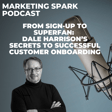
Building Barefoot Wine: Michael Houlihan on Innovation, Storytelling, and Brand Success
In this episode of Marketing Spark, Mark Evans chats with Michael Houlihan, co-founder of Barefoot Wine, about the accidental journey that led to one of the most recognizable wine brands in the world.
Michael shares how creative grassroots marketing, a commitment to listening to customers, and a unique positioning strategy helped Barefoot thrive in an industry dominated by high-end, elitist brands.
He reflects on the lessons that he and his wife, Bonnie Harvey, learned from building and scaling Barefoot, the challenges of distribution, and how they turned social advocacy into a powerful marketing tool.
Michael also discusses life after Barefoot, including the creation of The Barefoot Spirit, a business adventure book and audio theater series.
Tune in to discover Michael’s advice for entrepreneurs navigating today’s competitive markets and his insights on climate change-driven opportunities for the next generation of innovators.



















